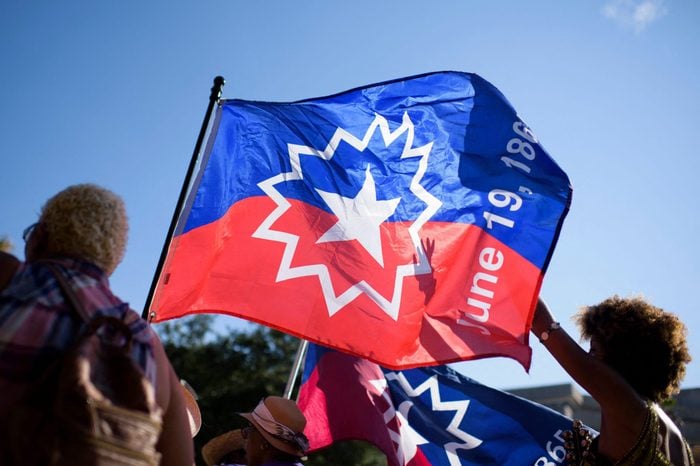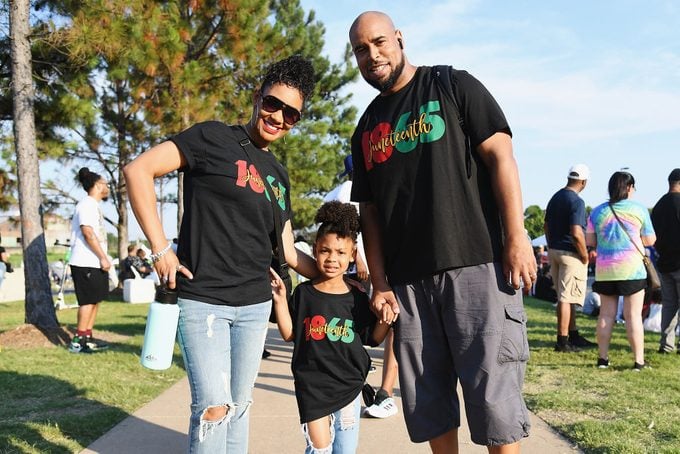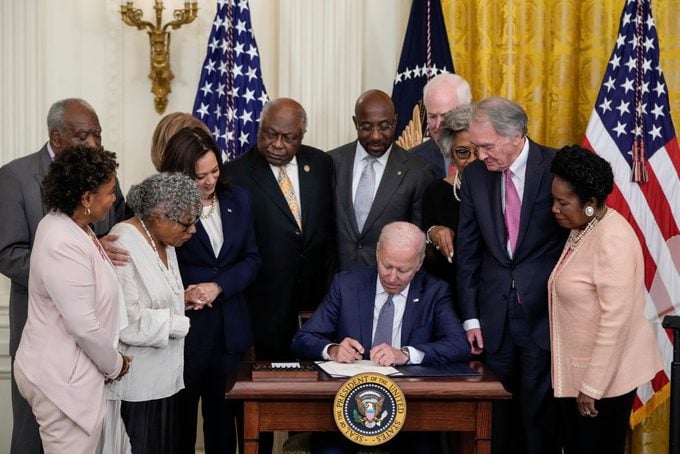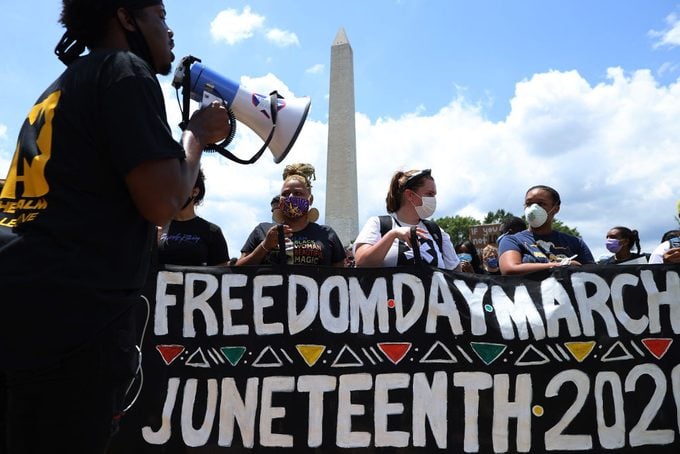What Is Juneteenth, and Why Do We Celebrate It?
Updated: Apr. 10, 2024

The national holiday commemorates the end of slavery and has been celebrated by Black Americans for more than a century. Here's what you need to know about Juneteenth.
When the 13 original colonies declared their independence from Great Britain on July 4, 1776, many Black Americans remained in bondage. Their enslavement continued for another 82 years, even after the colonies won their freedom in the Revolutionary War. That’s why Independence Day, the quintessential all-American holiday, doesn’t hold the same significance for many Black Americans today. Instead, they recognize Juneteenth as the true day of liberation. But what is the Juneteenth holiday, exactly?
Also known as Freedom Day and Emancipation Day, Juneteenth is a national holiday that commemorates an important day in history: June 19, 1865. Understanding its significance is as important as understanding the concepts of institutional racism and anti-racism. Taking the time to do that can also help you learn how to be a true ally to Black Americans and do more than simply show up in the fight against racism.
With corporations commercializing Juneteenth, it’s now more important than ever to celebrate the holiday’s true meaning. So grab your Juneteenth flag and get ready for a mini history lesson that’ll explain the holiday’s origins and importance. Then browse these powerful Juneteenth quotes, which will inspire you to keep fighting for equality.
What is Juneteenth?
The holiday commemorates a pivotal turning point in American history. On June 19, 1865, Union General Gordon Granger, accompanied by approximately 1,800 federal troops, arrived in Galveston, Texas, formerly part of the Confederate States of America. Setting the stage for what would become the most popular celebration of Black emancipation in the United States, he took over the state and enforced Abraham Lincoln’s Emancipation Proclamation of 1863.
When did slavery end in the United States?
On January 1, 1863, Lincoln’s Emancipation Proclamation declared all enslaved people free. But this didn’t mean immediate freedom for all slaves. That wouldn’t happen for another two years.
When Confederate General Robert E. Lee surrendered to Union General Ulysses S. Grant at the Appomattox Court House in Virginia on April 9, 1865, the Civil War officially ended. The cease-fire effectively freed slaves throughout the United States, per the decree of the 13th Amendment, which abolished slavery nationwide and passed through both houses of Congress in January 1865.
Yet slavery still persisted in far-flung areas of the country. With the arrival of the 24-hour news cycle more than a century away, word of the cease-fire took time to reach some soldiers in the South. The Army of the Trans-Mississippi, for example, didn’t formally surrender until May 26. Tragically, the United States suffered more military fatalities during the Civil War than in any war before or since.
And, of course, word didn’t make its way to Texas quite as quickly.
When did slavery end in Texas?
Upon his arrival in Galveston, Union General Granger issued General Order No. 3 at the Headquarters District of Texas. It declared, “The people of Texas are informed that, in accordance with a proclamation from the Executive of the United States, all slaves are free. This involves an absolute equality of personal rights and rights of property, between former masters and slaves, and the connection heretofore existing between them becomes that between employer and hired labor.”
It went on to advise freedmen to remain “at their present homes and work for wages,” as they would not be permitted to linger at military posts, and idleness would not be supported there or elsewhere.
Why was Texas so significant?
Few major Civil War battles had been waged in Texas, but the state was significant because it represented slavery’s last stand. Many slave owners from other states fled there with their slaves to protect their human property. Even after Granger’s arrival effectively freed the state’s 250,000 slaves, many owners withheld this information from their slaves until the close of the harvest season.
When is Juneteenth?

Like many other holidays, including the following month’s Independence Day, Juneteenth is celebrated on the same day each year. So, when is Juneteenth 2024? Mark your calendar: The holiday occurs on Wednesday, June 19.
Why is it called Juneteenth?
You might’ve already guessed as much, but the holiday’s name is a clever mash-up of the month and the date: “June” and “the nineteenth.”
Why is Juneteenth important?
What is the Juneteenth holiday if not an opportunity to recognize a significant chapter in American history—and the historic fight for equal rights that continues today. Given America’s current debate over anti-racism and how to fight racism, Juneteenth takes on greater meaning.
But what does Juneteenth mean? At the time, it meant freedom for people who were enslaved. Today, it’s also a reminder that the United States has a long history of inequality we’re still working to overcome.
If you want to do more than recognize it from the comfort of your couch, you can honor June 19 by donating time and/or money to Black Lives Matter organizations, the National Association for the Advancement of Colored People (NAACP), and the Smithsonian National Museum of African American History and Culture, among many other organizations dedicated to equality and empowerment for Black Americans. Also consider putting Juneteenth principles into practice daily by embracing the small ways you can fight racism every day.
Is Juneteenth a national holiday?

Juneteenth is a newly minted national holiday, but the roots of its celebration stretch back for centuries.
After full emancipation in 1865, some slave owners didn’t give up easily. Many slaves who acted on Granger’s announcement ended up paying with their lives. “You could see lots of n— hangin’ to trees in Sabine bottom right after freedom, ’cause they cotch ’em swimmin’ ‘cross Sabine River and shoot ’em,” former slave Susan Merritt recalled in historian Leon Litwack’s book Been in the Storm So Long: The Aftermath of Slavery. Those who persevered celebrated, and one year after slaves in Texas were declared free by Granger’s military order, the first Juneteenth celebration was held.
As the years passed and Black people migrated in and out of Texas, the tradition spread. In 1979, Texas became the first state to make Juneteenth an official statewide holiday, and other states followed throughout the years. But it would be almost half a century until Juneteenth joined days such as Martin Luther King Jr.’s birthday and the 4th of July as a national holiday.
So, when did Juneteenth become a federal holiday? On June 17, 2021, President Joe Biden signed a bill making it a national holiday.
What states do not recognize Juneteenth?
South Dakota was the only state in the nation that didn’t recognize Juneteenth, but that changed in February 2022. That’s when Governor Kristi Noem signed a bill to make Juneteenth a state holiday in South Dakota.
Do you wish someone a happy Juneteenth?
Many agree that it’s important to acknowledge the day and its significance to Black Americans. But there’s debate over whether saying “Happy Juneteenth” gets to the heart of the holiday. Ask yourself this: What does Juneteenth celebrate? While it commemorates a positive event (the end of slavery), it’s a reminder of a dark time in history and how far the country still has to go to ensure equality for all.
With that in mind, some people believe it’s more meaningful to reflect on freedom, equal rights, or steps you can take today to fight racism. To do your own research, consider these books by Black authors and these books about race relations in America as a starting point. (And support Black Americans by buying them at one of these Black-owned bookstores.)

What are some important Juneteenth facts?
It’s important to be able to answer, “What is the Juneteenth holiday?” But go beyond the basics by learning some facts about the holiday.
- Readings of the Emancipation Proclamation, religious ceremonies and the singing of spirituals marked some of the earliest traditions and celebrations.
- Today, flying the Juneteenth flag, with its red, white and blue colors, represents a second declaration of independence for Black Americans and recognizes that former slaves and their living descendants were and are free Americans too.
- Other prominent colors of the holiday are red, black and green, in honor of the Pan-African flag.
- Red is especially significant on Juneteenth, as the color represents the bloodshed and valor of Black American slaves.
- Barbecued chicken and meat, collard greens, sweet potatoes, watermelon, red soda water and tea cakes (the official Juneteenth dessert) are all on the menu.
- Many Black Americans don’t celebrate the 4th of July, opting to celebrate the Juneteenth holiday instead.
Armed with information about the importance of Juneteenth 2023, you’re poised to make a difference in the fight for equal rights. One way to do that? Support black-owned businesses and learn the history, such as why desegregation didn’t end racism in America.
Additional reporting by Jeremy Helligar.
Sources:
- National Archives: “National Archives Safeguards Original ‘Juneteenth’ General Order”
- American Battlefield Trust: “General Order No. 3”
- Juneteenth.com: “History of Juneteenth”
- Been in the Storm So Long: The Aftermath of Slavery by Leon F. Litwack
- History: “Texas passes a bill becoming the first state in the nation to make Juneteenth an official state holiday”
- Texas State Library and Archives Commission: “Texas Observes Juneteenth”


